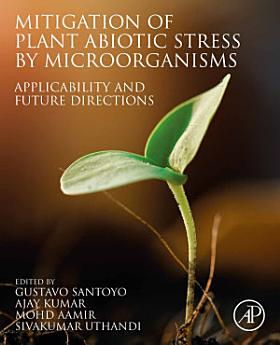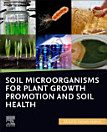Mitigation of Plant Abiotic Stress by Microorganisms: Applicability and Future Directions
About this ebook
About the author
Dr. Gustavo Santoyo obtained his Doctor of Science degree in Biomedical Sciences at the National Autonomous University of Mexico (UNAM) in 2005 and did postdoctoral studies during 2005-2007 at the Center for Cancer Research, NIH, USA, as well as a sabbatical year (2014-2015) at the Wilfrid Laurier University, Canada. He is currently a full-time research professor at the Institute of Chemical and Biological Research of the Universidad Michoacana de San Nicolás de Hidalgo, in Morelia, Mexico. His research interest is led towards plant-microbe interactions, biocontrol of fungal pathogens, development of bioinoculants for agricultural crops, and basic research on microbial diversity of extreme environments. In these research areas has published 80 scientific publications with more than 4000 citations and a h-factor 29. In the Academy, He has supervised more than 30 doctoral, master and undergrad thesis. Dr. Santoyo is a member of the Mexican Academy of Sciences and the National Research System (SNI) of the National Council of Science and Technology (CONACYT) in Mexico.
Dr. Ajay Kumar is currently working as an assistant professor at Amity Institute of Biotechnology, Amity University, Noida, India. Dr. Kumar completed his tenure (2018-2022) as a visiting scientist from Agriculture Research Organization, Volcani Center, Israel and doctoral research from Department of Botany, Institute of Science, Banaras Hindu University, Varanasi, India on the theme "Plant microbe interaction". In his research tenures, Dr. Kumar has published more than 235 scientific contributions in the form of research and review articles, books or book chapters with the leading International Journals or Publishers. He has wide area of research experience, especially in the field of Plant-Microbe Interactions, Microbial biocontrol, Postharvest management of fruits, Microbial endophytes related with the medicinal plants and cyanobacteria-pesticides interactions. Dr. Kumar actively engaged in editing book with the leading publisher like Elsevier, Springer, CRC Press, Willey and edited more than 48 books and currently serving as an Associate editor in Frontier in Microbiology, BMC Microbiology and special guest editor in Microorganisms or Plants MDPI, Journal.
Dr. Mohd Aamir is currently working as research fellow at the Indian Institute of Vegetable Research, Varanasi, India. Dr. Aamir completed his doctoral research from Department of Botany, Banaras Hindu University, India in 2018. He has immense interest in molecular plant-microbe interaction, stress physiology and also has expertise in Computational Biology and Bioinformatics. His research work is focused on molecular aspects of plant-pathogen interaction, and other innovative approaches to control plant diseases including (Bio-control aspects of microbes) and analyzing the molecular networks involved in plant disease signaling using the computation tools and techniques.
Prof. Sivakumar Uthandi is a Professor and Head at the Department of Agricultural Microbiology, Tamil Nadu Agricultural University (TNAU), Coimbatore. He has contributed 32 years of service at various levels from Assistant Professor to Dean (Post Graduate Studies). He had his graduation, and Doctorate from Tamil Nadu Agricultural University and obtained his post-doctoral training at the University of Florida USA, the University of Warwick UK, Borskeva Institute of Catalysis Russia, and Wageningen University, The Netherlands. He was recognized as Visiting Associate Professor at the University of Florida, USA. He is also holding the honorary position of Adjunct Professor at the University of Tokyo, Japan since 2019 to till-date (2024). He is a Fellow of Royal Society of Biology, London, Academy of Microbiological Sciences, India, and received 4 international 13 national and 9 state awards. He has contributed a lot on biocatalysts mediated biomass conversion, more particularly, lignin biotransformation leading to lignin derived renewable aromatics. So far, he has published 171 peer-reviewed research papers including 4 patents (1-US, 3-Indian) and 7 books. To his laurel, he has mobilized funds to the tune of INR 1171 lakhs and offered 35 fellowships to students which include 21 Masters, 6 Doctoral candidates and 8 PDFs.lakhs through various funding agencies ICAR, DBT, DST, Indo-Russia, Indo-US, SERB and MHRD-FAST. He is the Editor of Springe Nature’s Indian Journal Microbiology for the past 3 years.







